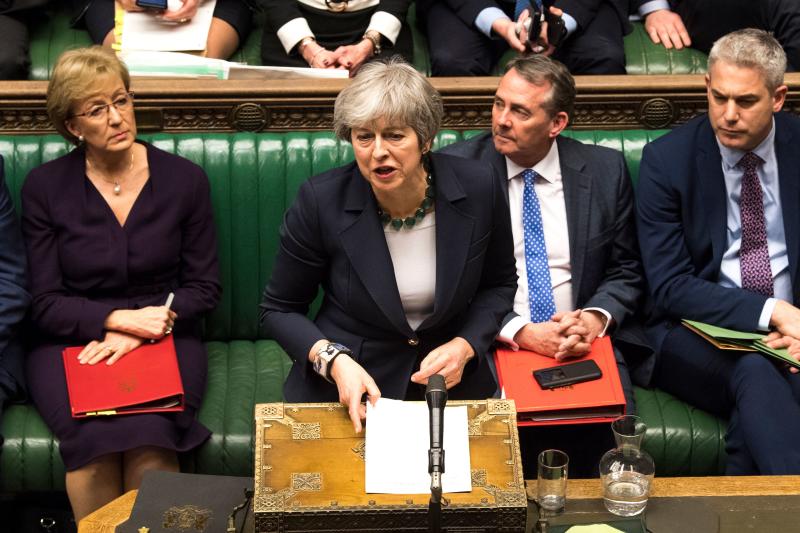News Analysis
Theresa May seeks way out of Brexit impasse after UK lawmakers vote against no-deal exit
Sign up now: Get ST's newsletters delivered to your inbox

British Prime Minister Theresa May responding to the result of a vote in the House of Commons in London, in which MPs signalled their opposition to leaving the EU with no deal, on March 13, 2019.
PHOTO: AFP
Follow topic:
LONDON - Days after rejecting a deal governing the terms of Britain's withdrawal from the European Union, the British parliament has now also narrowly rejected the option of leaving the EU with no negotiated deal whatsoever.
After a day of often chaotic debates, MPs voted to rule out the option of departing from the European Union without any negotiations by 321 votes to 278 - a majority of 43.
The result of these contradictory parliamentary antics is that British Prime Minister Theresa May will now have to ask EU governments to consent to a postponement of the date for Britain's departure from the Union, currently set for March 29.
But although severely weakened by her inability to control her own lawmakers, Mrs May has not given up hope that she may still prevail, and that her plan for Brexit - as the process of Britain's separation from the EU is now universally known - would ultimately have to be accepted by default, since there are no workable alternatives.
Mrs May spent the past two years negotiating the terms of her country's separation from Europe. But she made little effort to work out what British legislators were prepared to accept, and almost no effort to consult them.
The result is that the deal the British government agreed upon with EU officials - specifying matters such as how much money Britain would continue to pay into EU budgets - met with stiff opposition when it was presented for parliamentary ratification.
In January, MPs voted down Mrs May's negotiated deal by a majority of 230, the biggest such rebuke in against any sitting government. On Tuesday, the British premier tabled her proposal again, together with a clarification from Mr Jean-Claude Juncker, the President of the Commission, the EU's executive body, drafted in order to deflect some of the criticism against the Brexit deal.
However, this failed to persuade MPs, who still voted the negotiated deal down, with a majority of 149 in the 650-strong British House of Commons.
As Mrs May swiftly admitted after the results of the latest vote became known in the late hours of Wednesday, the only consequence of closing off both the negotiated and non-negotiated pathways to Brexit is that the British government will now have to ask the 27 remaining EU member-states to delay Britain's departure from the EU beyond the current date of March 29.
The assumption is that such an extension will be granted by the EU, since no European government would risk the economic mayhem which could ensue should Britain leave in less than two weeks from now, with no arrangement in place and no idea how its relations with Europe would be handled.
Yet there no agreement among the 27 member-states over how long such an extension should be, with some countries suggesting that the Brits should only be given an extra few months to put their affairs in order, while others suggest that the delay should be longer, even entailing a number of years, since it's patently clear that the Brits don't know what they want.
EU nation states will have to agree on this point soon, since any decision to postpone the date of Britain's departure from the Union must be taken by unanimity.
But in a move which surprised observers in London, Prime Minister May turned the debate over the length of the EU extension into a political weapon which may work to her advantage.

She announced that later on Thursday MPs in London will be asked to choose between what she termed as a "short, technical extension" to Britain's scheduled departure from the EU should they broadly agree with what Mrs May has already negotiated with the EU or, if they want more substantial negotiations with the EU, there would be a "much longer extension" to the period of negotiations.
Mrs May's plan is to effectively corner her opponents into either backing down to allow the prime minister's negotiated Brexit deal to be ratified after all, or risk a potentially lengthy renegotiation, which could well result in Brexit never happening.
This strong-arm tactic may yet prove to be a shrewd one, which could still save the day and ensure that Britain leaves the European Union in the near future, on amicable and predictable terms.
But if there is one constant element in Britain's current European debate is that nothing is now predictable.

